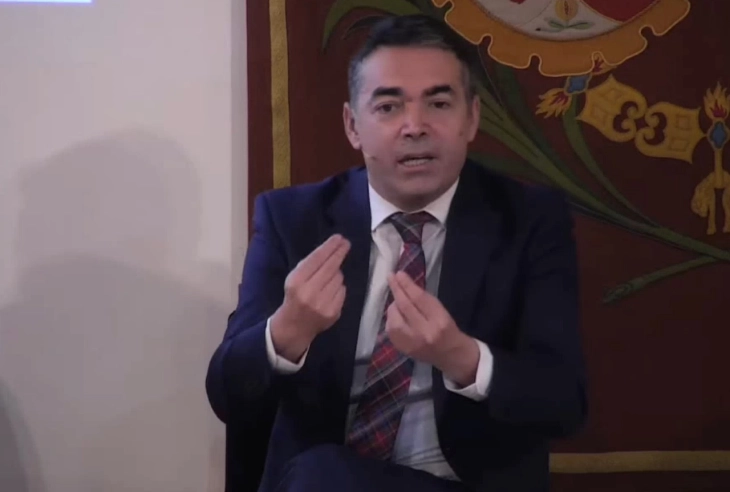Anti-European criteria can’t be precondition for EU accession, Dimitrov says regarding Bulgaria dispute

Skopje, 19 November 2021 (MIA) – Deputy PM for European Affairs Nikola Dimitrov presented North Macedonia’s position regarding the dispute with Bulgaria during a discussion on EU enlargement in Madrid.
“Blocking the EU integration process goes against Article 2 of the Friendship Treaty. Macedonian politicians ensured conditions for the success of the Commission on Historical and Education Issues, which has held many meetings, and proposed foreign expert assistance for their activities. The treaty launched a curial process, which has been disrupted by reasons still unknown,” Dimitrov told the event according to the Secretariat for European Affairs.
The draft-negotiating framework, he added, which is still on the table, contains a technical paragraph that’s same for all candidate countries starting talks and refers to the translation of the EU acquis in their language, in our case the Macedonian language, in order to ensure that the country will act in line with EU rules and principles once it becomes a member.
“Therefore, this issue is treated as a matter of self-determination and falls under international law, as there’s no legal or moral reason for any country or the EU not to recognize a language. Language is a national matter, according to international law,” Dimitrov stressed.
The Deputy PM also discussed attempts for overcoming this issue, as well as the efforts of the Trio Presidency of the Council of the European Union.
“Bulgaria set five bilateral issues as condition for giving a green light, but couldn’t reaffirm this position. If we are guided by the Portuguese proposal, that is the proposal backed by the Trio Presidency, we can find a reasonable solution,” he noted.
Moreover, he underlined that the Bulgarian blockade is an investment in antagonism instead of friendship, as confirmed by a recently-published research carried out by a Bulgarian think-tank, which shows that hate speech on social media is spurred by the Bulgarian veto.
“A moving target is created when beside these five issues, the issues of discrimination and the census are also raised, especially when there’s no discrimination or census results. It’s hard to be friends when there’s no respect for the other side’s dignity. As I’ve said before, if an accession precondition is not in line with European values and the Macedonian language is put up for discussion, it’s better not to achieve progress in the process, because we won’t be joining a community that shares our values,” Dimitrov stressed.
He also noted that anti-European criteria can’t be a precondition for a country to join the EU, especially not after the country managed to resolve the name dispute with Greece, which was only possible because Greece acknowledged our right to self-determination, as well as the Macedonian language.
Dimitrov also discussed why North Macedonia’s government hasn’t responded to the 5+1 set of measures proposed by Bulgaria and why the country expects Bulgaria to change its position by December 14.
“I negotiated the bilateral agreement, which aims to enhance cooperation and build a better future, leaving history to the historians in the commission, who have met a dozen times in the past few years. We also wanted to increase their chances for success by proposing to bring in UNESCO, German and Czech experts to offer assistance,” Dimitrov said.
Article 2 of the Friendship Treaty, he added, says that Bulgaria will assist North Macedonia’s EU integration efforts.
“Blocking is not helping. We started a very important process which has been disrupted. I personally still struggle to understand why. The draft-negotiating framework, which is still on the table, contains a technical paragraph that’s same for all candidate countries that are starting talks and refers to the translation of the EU acquis in their language, in our case the Macedonian language, in order to ensure that the country will act in line with EU rules and principles once it becomes a member. Bulgaria has an issue with this paragraph, which I believe is harmful for our friendship. There’s no legal basis for a country, as well as the EU, not to recognize a language. Language is a national matter, according to international law,” the Deputy PM highlighted.
He noted that the disruption of the process is an investment in antagonism, instead of friendship, adding that it’s hard to be friends if the other side’s dignity is disrespected.
“Regarding claims over discrimination of Macedonian citizens with Bulgarian ethnic origin, no cases have been presented to the anti-discrimination commission or European Court of Human Rights. Knowing exactly what we need to work on is important. The more we speak publically, the less we’re negotiating. If we negotiate more, we’ll also be more careful what we tell the public,” Dimitrov said.







